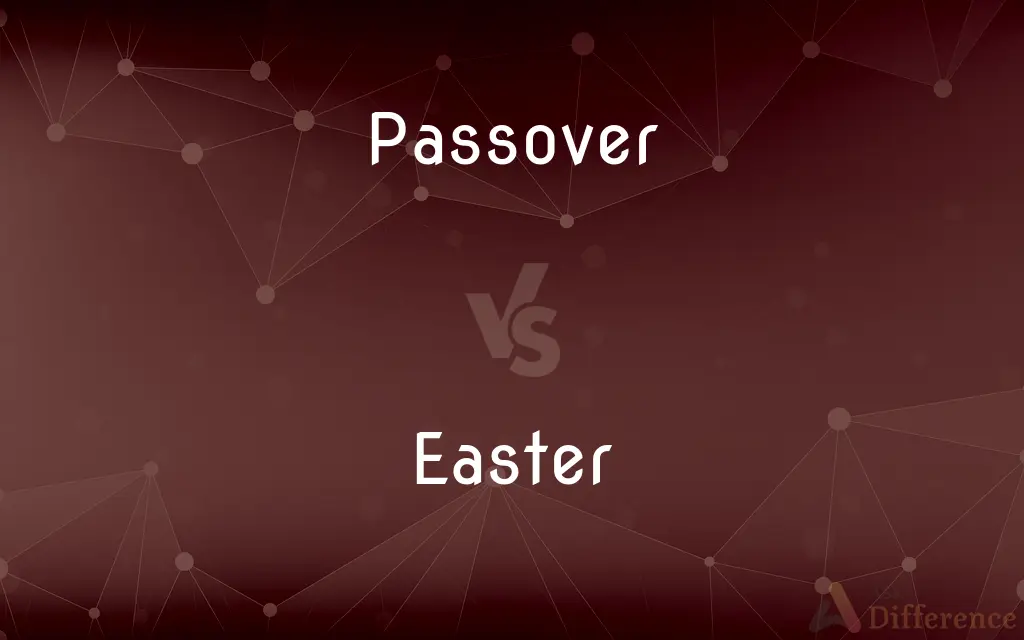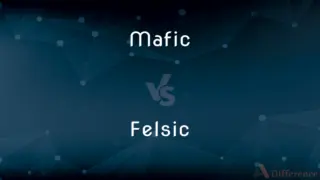Passover vs. Easter — What's the Difference?
By Tayyaba Rehman & Urooj Arif — Updated on April 1, 2024
Passover commemorates the Hebrews' liberation from slavery in Egypt, focusing on freedom and heritage, while Easter celebrates Jesus Christ's resurrection, symbolizing rebirth and eternal life.

Difference Between Passover and Easter
Table of Contents
ADVERTISEMENT
Key Differences
Passover, a Jewish festival, marks the liberation of the Israelites from Egyptian slavery, emphasizing freedom and divine intervention. On the other hand, Easter, a central Christian holiday, celebrates the resurrection of Jesus Christ from the gone, underscoring themes of redemption and new life.
During Passover, the Seder meal is a pivotal ritual involving symbolic foods and storytelling to recount the Exodus story, highlighting God's deliverance. Whereas Easter traditions often include attending church services, and for many, the Easter Bunny and egg hunts, representing Christ's rebirth and fertility.
Passover is observed for seven or eight days, depending on Jewish tradition, with strict dietary laws like abstaining from leavened bread to commemorate the Israelites' hasty departure from Egypt. In contrast, Easter is a single day that culminates the Holy Week, reflecting on Jesus’ crucifixion and resurrection.
The timing of Passover is based on the Hebrew lunar calendar, typically falling in March or April, directly linked to the Exodus narrative. Easter’s date varies annually, calculated based on a lunar-solar calendar system, the first Sunday after the first full moon following the vernal equinox.
Comparison Chart
Significance
Commemorates the Hebrews' liberation from slavery
Celebrates the resurrection of Jesus Christ
ADVERTISEMENT
Main Symbols
Matzah, bitter herbs, Seder plate
Cross, Easter eggs, Easter bunny
Duration
7 or 8 days
1 day, ending Holy Week
Calendar
Hebrew lunar calendar
First Sunday after the first full moon post equinox
Key Rituals
Seder meal, reading the Haggadah
Church services, egg hunts, lighting candles
Compare with Definitions
Passover
Features the Seder meal with symbolic foods.
The Seder plate on Passover contains items like bitter herbs and charoset, representing aspects of the Exodus.
Easter
A Christian holiday celebrating Jesus Christ's resurrection.
Easter Sunday is observed with special church services commemorating Christ’s resurrection.
Passover
Observed with the removal of leavened bread from homes.
In preparation for Passover, households thoroughly clean to remove all chametz.
Easter
Features egg hunts and the Easter Bunny.
Children enjoy Easter egg hunts as part of the holiday’s traditions, symbolizing new life.
Passover
A Jewish festival commemorating the Israelites' exodus from Egypt.
During Passover, families gather for the Seder to retell the story of their ancestors' liberation.
Easter
Often involves the lighting of candles.
Candles are lit during Easter to symbolize Jesus Christ as the light of the world.
Passover
Incorporates the reading of the Haggadah.
The Haggadah is read during Passover to recount the story of the Exodus from Egypt.
Easter
Marked by the end of Lent, a period of fasting.
Many Christians prepare for Easter with forty days of Lent, focusing on prayer and penance.
Passover
Involves children asking the Four Questions.
At the Passover Seder, the youngest child asks the Four Questions to spark discussion about the festival.
Easter
A Christian feast commemorating the Resurrection of Jesus.
Passover
Passover, also called Pesach (; Hebrew: פֶּסַח Pesaḥ), is a major Jewish holiday that occurs on the 15th day of the Hebrew month of Nisan, the first month of Aviv, or spring. The word Pesach or Passover can also refer to the Korban Pesach, the paschal lamb that was offered when the Temple in Jerusalem stood, to the Passover Seder, the ritual meal on Passover night, or to the Feast of Unleavened Bread.
Easter
The day on which this feast is observed, the first Sunday following the full moon that occurs on or next after March 21.
Passover
A holiday beginning on the 14th of Nisan and traditionally continuing for eight days, commemorating the exodus of the Hebrews from Egypt. Also called Pesach.
Easter
Eastertide.
Passover
Alternative case form of Passover
Easter
Eastern.
Passover
(Judaism) a Jewish festival (traditionally 8 days) celebrating the exodus of the Israelites from Egypt
Easter
A strong easterly wind (a wind blowing from the east).
Easter
To move toward the east.
Easter
An annual church festival commemorating Christ's resurrection, and occurring on Sunday, the second day after Good Friday. It corresponds to the pascha or passover of the Jews, and most nations still give it this name under the various forms of pascha, pasque, pâque, or pask.
Easter
The day on which the festival is observed; Easter day.
Sundays by thee more glorious break,An Easter day in every week.
Easter
To veer to the east; - said of the wind.
Easter
A Christian celebration of the Resurrection of Christ; celebrated on the Sunday following the first full moon after the vernal equinox
Easter
A wind from the east
Common Curiosities
How is the date for Passover determined?
Passover's date is set according to the Hebrew lunar calendar, usually in March or April.
What is the significance of Passover?
Passover commemorates the liberation of the Israelites from Egyptian slavery, focusing on freedom and divine intervention.
Why is leavened bread avoided during Passover?
Leavened bread is avoided to remember the Israelites' hasty departure from Egypt, when they did not have time to let their bread rise.
What is the Easter Bunny?
The Easter Bunny is a folkloric figure and symbol of Easter in some cultures, representing fertility and new life.
How do Christians celebrate Easter?
Christians celebrate Easter with church services, and some also engage in traditions like egg hunts and the Easter Bunny, symbolizing rebirth.
What are the Four Questions in Passover?
During Passover, the Four Questions are asked by the youngest child at the Seder, inquiring about the night's uniqueness.
What is Lent and how is it related to Easter?
Lent is a 40-day period of fasting, prayer, and penance before Easter, observed by Christians to prepare spiritually for Holy Week.
What does the Seder meal symbolize?
The Seder meal during Passover symbolizes the Israelites' suffering, liberation, and the hope of future redemption.
How is Easter's date calculated?
Easter date is determined by the lunar-solar calendar, specifically the first Sunday after the first full moon following the vernal equinox.
Why is Easter considered a movable feast?
Easter's date changes yearly, calculated as the first Sunday after the first full moon following the vernal equinox.
What is the significance of Easter eggs?
Easter eggs symbolize new life and resurrection, tying back to the theme of Jesus Christ's resurrection.
What role does the Haggadah play in Passover?
The Haggadah guides the Passover Seder, telling the Exodus story and explaining the meal's symbolic foods.
What dietary restrictions are observed during Passover?
During Passover, Jews abstain from chametz (leavened bread and related products), remembering the Israelites' rapid exodus from Egypt.
Can Passover and Easter coincide?
Yes, due to their springtime scheduling and lunar calendar influences, Passover and Easter can sometimes coincide or be very close in date.
Share Your Discovery

Previous Comparison
Mafic vs. Felsic
Next Comparison
Scientist vs. EngineerAuthor Spotlight
Written by
Tayyaba RehmanTayyaba Rehman is a distinguished writer, currently serving as a primary contributor to askdifference.com. As a researcher in semantics and etymology, Tayyaba's passion for the complexity of languages and their distinctions has found a perfect home on the platform. Tayyaba delves into the intricacies of language, distinguishing between commonly confused words and phrases, thereby providing clarity for readers worldwide.
Co-written by
Urooj ArifUrooj is a skilled content writer at Ask Difference, known for her exceptional ability to simplify complex topics into engaging and informative content. With a passion for research and a flair for clear, concise writing, she consistently delivers articles that resonate with our diverse audience.
















































